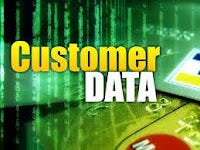A new bill moving through Congress would give Big Brother unprecedented access to citizens' information.

The government has figured out how to get around the laws, and collect personal data that has been historically denied to them: ask corporate America for it.
It's no secret that we're monitored continuously on the Internet. Some of the company names you know, such as Google and Facebook. Others hide in the background as you move about the Internet. There are browser plugins that show you who is tracking you. One Atlantic editor found 105 companies tracking him during one 36-hour period. Add data from your cell phone (who you talk to, your location), your credit cards (what you buy, from whom you buy it), and the dozens of other times you interact with a computer daily, we live in a surveillance state beyond the dreams of Orwell.
It's all corporate data, compiled and correlated, bought and sold. And increasingly, the government is doing the buying. Some of this is collected using National Security Letters (NSLs). These give the government the ability to demand an enormous amount of personal data about people for very speculative reasons, with neither probable cause nor judicial oversight. Data on these secretive orders is obviously scant, but we know that the FBI has issued hundreds of thousands of them in the past decade -- for reasons that go far beyond terrorism.
NSLs aren't the only way the government can get at corporate data. Sometimes they simply purchase it, just as any other company might. Sometimes they can get it for free, from corporations that want to stay on the government's good side.
CISPA will allow the government to collect all sorts of personal data from corporations, without any oversight at all, and will protect corporations from lawsuits based on their handing over that data. Without hyperbole, it's been called the death of the 4th Amendment. Right now, it's mainly the FBI and the NSA who are getting this data, but -- all sorts of government agencies have administrative subpoena power.
Data on this scale has all sorts of applications. From finding tax cheaters by comparing data brokers' estimates of income and net worth with what's reported on tax returns, to compiling a list of gun owners from Web browsing habits, instant messaging conversations, and locations -- did you have your iPhone turned on when you visited a gun store? -- the possibilities are endless.
Government photograph databases form the basis of any police facial recognition system. They're not very good today, but they'll only get better. But the government no longer needs to collect photographs. Experiments demonstrate that the Facebook database of tagged photographs is surprisingly effective at identifying people. As more places follow Disney's lead in fingerprinting people at its theme parks, the government will be able to use that to identify people as well.
In a few years, the whole notion of a government-issued ID will seem quaint. Among facial recognition, the unique signature from your smart phone, the RFID chips in your clothing and other items you own, and whatever new technologies that will broadcast your identity, no one will have to ask to see ID. When you walk into a store, they'll already know who you are. When you interact with a policeman, she'll already have your personal information displayed on her Internet-enabled glasses.
Soon, governments won't have to bother collecting personal data. We're willingly giving it to a vast network of for-profit data collectors, and they're more than happy to pass it on to the government without our knowledge or consent.
http://www.theatlantic.com/technology/archive/2013/04/governments-wont-need-to-issue-ids-data-brokers-will-identify-you-for-them/275431/
E-Verify ID isn't ready to be implemented nationwide:
ST. Paul, MN. - Minneapolis-based attorney DeAnne Hilgers isn't sold on Congress' plan to require all employers to use a government database to verify whether new hires are eligible to work in the United States.
She has represented several employers who have been misled by E-Verify, a database maintained by the U.S. Department of Homeland Security and the Social Security Administration.
In one case, Hilgers' client got a call from an out-of-state resident who said his identity had been stolen and that his Social Security number was being used by one of the client's employees.
"We gave that worker the opportunity to address the claim and he walked out the door and we never saw them again," said Hilgers, who works at Lindquist & Vennum. She declined to name her client because the client had not given her permission.
It's the type of scenario that has prompted Sen. Al Franken, D-Minn., to raise concerns about a provision in the Senate immigration bill that would make E-Verify mandatory for all businesses within five years. He said the requirement could be burdensome for small businesses including small farming operations, which hire many immigrant workers.
The system is still prone to misidentifying legal workers. It has a false positive rate of about 0.7 percent, which is simply too high for small businesses and farmers already stretched for time, Franken says.
"The system isn't ready for prime time," Franken said during a press call last week. "Big businesses have the HR departments to deal with these errors. But for a small business where your accountant is also your front desk clerk and your mechanic and maybe your spouse, these kinds of errors are going to be a huge problem."
The system is still prone to misidentifying legal workers. It has a false positive rate of about 0.7 percent, which is simply too high for small businesses and farmers already stretched for time, Franken says.
http://minnesota.publicradio.org/display/web/2013/04/25/politics/franken-e-verify-not-ready-for-prime-time


